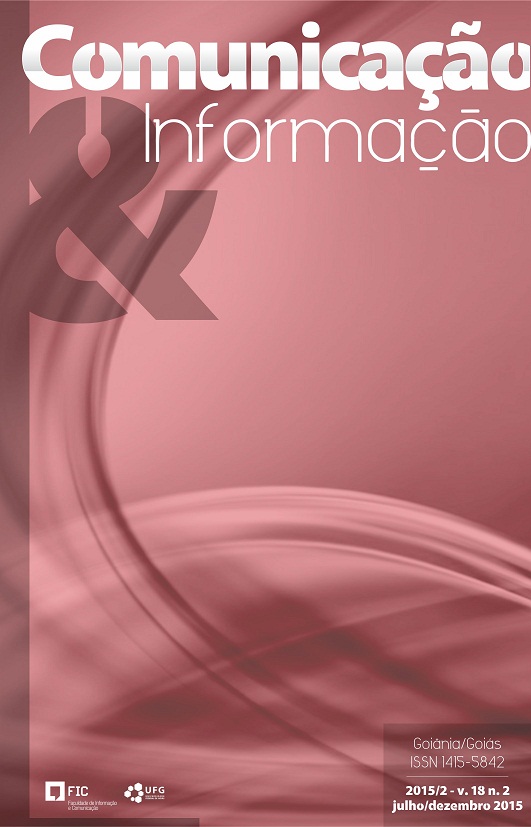Spiritualists symbologies in television drama: religiosity in the fictional universe of Rede Globo
DOI:
https://doi.org/10.5216/35809Keywords:
Soap operas. Spiritism. Fiction. Religious media coverage.Abstract
This study articulates and systematize the results of a study that sought to understand the mystical-religious senses addressed by the soap operas of RedeGlobo, from the analysis of fictional works Amor Eterno Amor, A Viagem e EscritonasEstrelas, freely inspired by the spiritual doctrine of Allan Kardec. Inserting the epistemological field of Cultural Studies, started from the premise that television drama influences the social globalization various themes, including religious, instigating interactions in the public sphere which, empathic and sensory way, is left to affect the content fiction. Under this view, the novels disseminate new interpretations of the religious universe, promoting dynamics of sociability, woven from the redefinition of their stories, which show polysemic and instigate new rationales. Given this theoretical horizon, thinking about the role of television drama in religiosities approach shows up an important research perspective to the field of communication, as it reflects the process of contemporary media coverage, marked by the interpenetration of media logic in various social fields, in particularly with regard to religion-culture binomial. In this sense, the study indicates that messages of television fiction transcend temporality in which they were written, as they produce appropriations that generate new symbolic practices in the social space, setting privileged environments for the spread of religious symbols and archetypes.
Downloads
References
BULHÕES, M. A ficção nas mídias: um curso sobre a narrativa nos meios audiovisuais. São Paulo: Ática, 2009.
CARVALHO, J. J. Religião, mídia e os predicamentos da convivência pluralista. Brasília: UNB, 1997.
DUARTE, J. Entrevista em profundidade. In: DUARTE, J.; BARROS, A. (Orgs). Métodos e técnicas de pesquisa em comunicação. São Paulo: Atlas, 2005. p. 62-83.
FAUSTO NETO, A.; GOMES, P. G. Midiatização e processos sociais na América Latina. São Paulo: Paulus, 2008.
FECHINE, Y.; FIGUEIROA, A. Produção ficcional brasileira no ambiente de convergência: experiências sinalizadoras a partir do Núcleo Guel Arraes. IN: LOPES, M. I.V. (Org). Ficção televisiva no Brasil: temas e perspectivas. São Paulo: Globo, 2009. p. 353-394.
GORDILLO, I. Manual de narrativa televisiva. Madrid: Sintesis, 2010.
HALL, S. A identidade cultural na pós-modernidade. 9. ed. Rio de Janeiro: DP&A, 2004.
KARDEC, A. O livro dos espíritos: princípios da doutrina espírita. São Paulo: FEB, 2008.
LOPES, M. I. V. Telenovela como recurso comunicativo. Revista Matrizes, São Paulo, ano. 3, n. 1, ago./dez., p. 21-47, 2009.
MARTÍN-BARBERO, J. Dos meios às mediações. Rio de Janeiro: UFRJ, 2002. Ok
MARTINO, L. M. Mídia e poder simbólico: um ensaio sobre comunicação e campo religioso. São Paulo: Paulus, 2003.
MOTTA, L. G. Análise pragmática da narrativa jornalística. In: LAGO, C.; BENETTI, M. (Orgs). Metodologia de pesquisa em jornalismo. Petrópolis: Vozes, 2007. p.143-167.
MOUSINHO, L. A. A sombra que me move: ensaios sobre ficção e produção de sentido (cinema, literatura, TV). João Pessoa: Ideia, 2012.
PAIVA, C. C. Dionísio na idade mídia: estética e sociedade na ficção televisiva seriada. João Pessoa: UFPB, 2010.
PEREIRA, Y. A. Memórias de um suicida. 27. ed. Rio de Janeiro: FEB, 2012.
RUDIO, F. V. Introdução ao projeto de pesquisa científica. 26. ed. Petrópolis: Vozes, 1999.
SANTAELLA, L. Comunicação e pesquisa: projetos para mestrado e doutorado. São Paulo: Hacker Editores, 2001.
SODRÉ, M. A narração do fato: notas para uma teoria do acontecimento. Petrópolis: Vozes, 2008.
SODRÉ, M. Antropológica do espelho: uma teoria da comunicação linear e em rede. Petrópolis: Vozes, 2009.
SOUZA, M. C. J.; OROFINO, I.; RIGHINI, R. R. Criadores na dramatização da juventude, do feminino e da pobreza. In: LOPES, M. I.V. (Org.). Ficção televisiva no Brasil: temas e perspectivas. São Paulo: Globo, 2009. p. 19-64.
Published
How to Cite
Issue
Section
License
Os autores dos trabalhos publicados na revista Comunicação e Informação retêm os direitos autorais sem restrições e concedem à revista o direito de primeira publicação, com o trabalho simultâneo licenciado sob a Licença Creative Commons Atribuição-NãoComercial que permite o compartilhamento do trabalho para fins não comerciais com reconhecimento da autoria e o privilégio de publicação primeiramente por esta revista. Caso o texto venha a ser publicado posteriormente em outro veículo, solicita-se aos autores informar que o mesmo foi originalmente publicado como artigo na revista Perspectiva, bem como citar as referências bibliográficas completas dessa publicação.
Os direitos autorais dos artigos pertencem aos autores e o conteúdo dos artigos assinados é de responsabilidade exclusiva dos autores.
A revista se reserva o direito de efetuar, nos originais, alterações de ordem normativa, ortográfica e gramatical, com o intuito de manter o padrão culto da língua, respeitando, porém, o estilo dos autores.
A revista também se reserva o direito de traduzir o artigo, no todo ou em parte, para o inglês ou para o português, dependendo do idioma em que o artigo tenha sido escrito originalmente.



